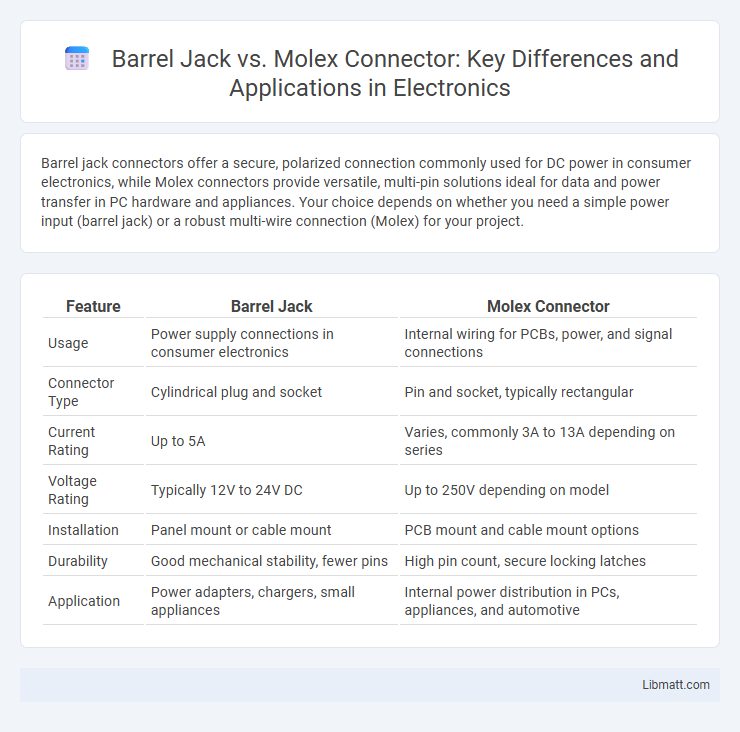Barrel jack connectors offer a secure, polarized connection commonly used for DC power in consumer electronics, while Molex connectors provide versatile, multi-pin solutions ideal for data and power transfer in PC hardware and appliances. Your choice depends on whether you need a simple power input (barrel jack) or a robust multi-wire connection (Molex) for your project.
Table of Comparison
| Feature | Barrel Jack | Molex Connector |
|---|---|---|
| Usage | Power supply connections in consumer electronics | Internal wiring for PCBs, power, and signal connections |
| Connector Type | Cylindrical plug and socket | Pin and socket, typically rectangular |
| Current Rating | Up to 5A | Varies, commonly 3A to 13A depending on series |
| Voltage Rating | Typically 12V to 24V DC | Up to 250V depending on model |
| Installation | Panel mount or cable mount | PCB mount and cable mount options |
| Durability | Good mechanical stability, fewer pins | High pin count, secure locking latches |
| Application | Power adapters, chargers, small appliances | Internal power distribution in PCs, appliances, and automotive |
Introduction to Barrel Jack and Molex Connector
Barrel jacks are cylindrical power connectors commonly used in low-voltage DC applications, offering easy plug-and-play functionality for devices like laptops and routers. Molex connectors, known for their versatility and reliability, are multipin electrical connectors widely used in computer hardware and automotive industries for power and signal transmission. Understanding the differences in design and application between barrel jacks and Molex connectors is essential for selecting the appropriate power connection solution.
Overview: What is a Barrel Jack?
A Barrel Jack is a cylindrical power connector commonly used to supply direct current (DC) to electronic devices. It features a hollow outer barrel and a central pin, allowing easy and secure connection for power adapters. Understanding the design and application of a Barrel Jack helps you select the right power interface for your device compared to a Molex connector.
Overview: What is a Molex Connector?
A Molex connector is a type of electrical connector commonly used to supply power to computer components such as hard drives, optical drives, and fans. It features a plastic housing with multiple pins or sockets that provide secure, reliable electrical connections in various electronic devices. Understanding the differences between a Molex connector and a barrel jack helps you choose the right power interface for your project or device.
Key Differences Between Barrel Jack and Molex Connector
Barrel jack connectors typically provide power for low-voltage devices with a cylindrical design, while Molex connectors deliver reliable multi-pin connections for power and data in complex electronics. Barrel jacks excel in simplicity and ease of use for single power lines, whereas Molex connectors handle multiple circuits, making them ideal for computer hardware and intricate wiring systems. Your choice depends on whether you need straightforward power delivery or versatile connectivity for multiple signals.
Electrical Specifications Comparison
Barrel jacks typically operate at lower voltages ranging from 5V to 24V with current ratings up to 5A, making them suitable for low-power DC applications, while Molex connectors offer higher current capacities, often exceeding 9A per pin, and support voltages up to 250V AC/DC. Molex connectors provide more precise electrical contact with multiple pin configurations, ensuring better distribution of power and signal integrity in complex electronic assemblies. The choice between barrel jack and Molex depends on voltage, current requirements, and application complexity, with Molex preferred for high-power or multi-line setups.
Use Cases: Barrel Jack vs Molex Connector
Barrel jack connectors are commonly used in low-voltage power supply applications such as laptops, routers, and LED lighting due to their easy-to-use, plug-and-play design. Molex connectors, known for their durability and secure fitting, are widely employed in computer hardware, automotive wiring, and industrial equipment where reliable, multi-pin connections are essential. Your choice depends on whether you require simple power input (Barrel Jack) or complex multi-wire connections with high current capacity (Molex).
Installation and Compatibility Factors
Barrel jack connectors offer straightforward installation with plug-and-play design, making them compatible with many DC-powered devices, but require matching voltage and polarity for proper operation. Molex connectors provide versatile pin configurations and secure locking mechanisms, ensuring reliable connections in complex wiring setups, though they may require crimping tools for installation. Your choice depends on the device's voltage requirements, connector type, and ease of assembly for your specific application.
Durability and Reliability Analysis
Barrel jack connectors typically offer moderate durability with a plastic housing prone to wear under frequent use, while Molex connectors feature robust locking mechanisms and metal contacts that ensure higher reliability in maintaining secure electrical connections. The metal pins in Molex connectors resist corrosion and mechanical stress better than the barrel jack's simpler contact design. For your projects requiring long-term stability and consistent power delivery, Molex connectors generally provide superior durability and reliability compared to barrel jacks.
Cost Implications for Projects
Barrel jack connectors typically incur lower costs due to their simplicity and widespread availability, making them ideal for budget-sensitive projects. Molex connectors, with their robust design and secure connection features, often come at a higher price point but offer enhanced durability and reliability. Choosing between barrel jack and Molex connectors depends on balancing expense, project requirements, and the desired connection quality.
Choosing the Right Connector: Decision Guide
Selecting the right connector between Barrel Jack and Molex depends on power requirements and application compatibility; Barrel Jacks are ideal for low-voltage DC power delivery in consumer electronics, while Molex connectors excel in providing secure connections for higher current and complex wiring systems in industrial and computer hardware. Consider voltage ratings, current capacity, physical size, and pin configuration to ensure proper fit and reliable performance. Evaluating environmental factors such as exposure to vibrations or moisture helps determine whether a Molex connector's locking mechanism or the simplicity of a Barrel Jack is more suitable for durability and maintenance needs.
Barrel Jack vs Molex Connector Infographic

 libmatt.com
libmatt.com